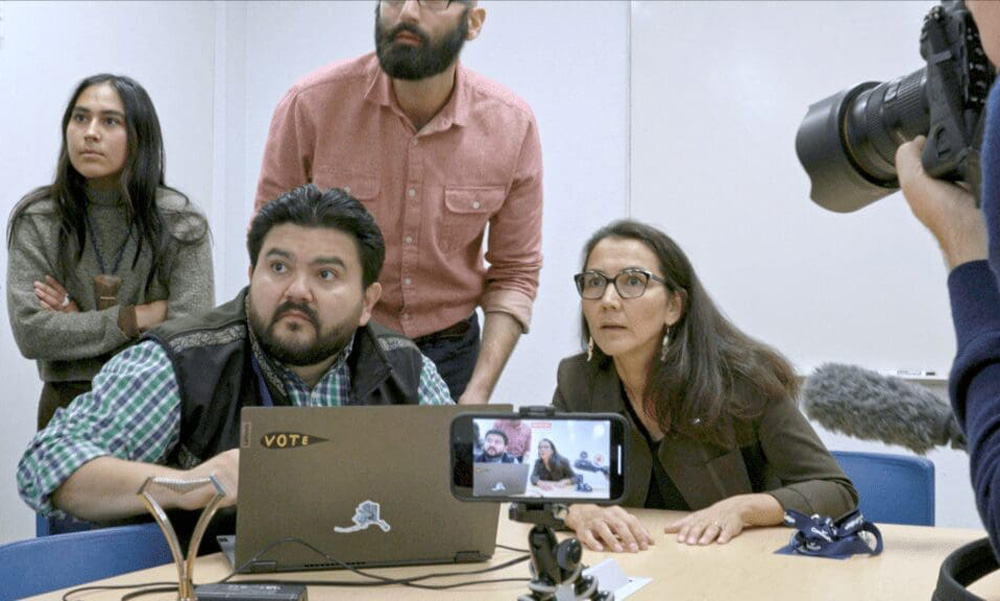It may seem like a relic of a bygone time to take the temperature of how a community will vote in a local election by going to a local diner, but leave it to A.J. Schnack, who’s been deeply invested in illuminating the strengths and weaknesses of America’s political process with films such as “Convention” and “Caucus,” to find a fresh use for it in his latest film “Majority Rules.” After all, there’s a reason the diner visit is a time honored tradition – the results are full of flavor, for starters, but removed from talk of strategy or political gamesmanship that frame any given race, the plain spoken assessments of the issues at hand reflect what voters actually want.
In “Majority Rules,” this diner exists as a hypothetical, even if there’s no doubt that Schnack spent time in many during the making of his latest film, employed as a visual metaphor to explain how voters are often left with the least desirable candidates any given election cycle after the primary process narrows the field to the most extreme ends of the political spectrum when it’s the party base that turns out to vote. Likened to having only liver and onions, Hawaiian pizza, fish tacos and meatloaf on the menu when those with broader tastes might want something gentler on the stomach, the filmmaker is able to make sense of a situation that can seem arcane to most voters once they arrive at the polls for the general election.
However, Schnack has never been one to simply raise an issue, but to find potential fixes, which he does well by looking to Alaska, the first state in the union to adopt a ranked choice ballot for their 2022 midterms. The director may arrive interested in the process, but he ends up covering a particularly consequential election locally when beloved Republican Congressman Don Young, who held his seat for nearly 39 years, dies unexpectedly and his seat leads to a heated contest between Republicans Sarah Palin and Nick Begich, with long political legacies for better or worse, and Mary Peltola, a beloved state House rep who would be the first Native American elected to Congress from the state and almost just as rare these days in the state – a Democrat.
The dynamics of the race are not what anyone from afar would think – Palin won’t say a bad word about Peltola when the two became friends in the state capitol, and plenty of Republicans have bad things to say about Palin, who they feel abandoned the state when she accepted the VP slot on the 2008 Presidential ticket with John McCain. But even more intriguingly, the dynamics are not what the candidates could expect either with the advent of a ranked choice ballot when rather than appealing strictly to their base, they are incentivized to woo a wider swath of voters to make it into the general election. Being in Alaska, Schnack also checks in on Senator Lisa Murkowski’s bid for reelection, spared a preliminary primary challenge from a more right-wing candidate because of the ranked choice system, and Cathy Giessel, the Republican majority leader of the State Senate who sees an opening to reclaim her seat after a far-right candidate knocked her out in 2020, claiming she was too bipartisan.
The strident belief in finding middle ground can feel slightly quaint, with Schnack’s wry narration aimed squarely at charming an audience that might not even give the film a chance based in part because of the very issues the film raises. However, the director summons the same folksy charm that it takes to win over voters in the actual elections and the more locally specific the film gets in terms of how unexpected coalitions are forming around certain candidacies and election reform, the broader it plays. Supplementary visits to Wisconsin, Idaho, Nevada, Oregon and Nebraska where state legislatures are considering changes to their own electoral systems illuminate an issue where bipartisanship is possible and could open the door to working together on others, and for as much as “Majority Rules” illustrates the giant cumbersome apparatus of democracy at work, it takes great care to show how the system is still very much made up of people. With the candidates in Alaska from Senator Murkowski on down in stature standing on street corners to secure votes, hardly looking like the rigid ideologues one might think from more general news coverage, the film offers up at least one unquestionably winning campaign in suggesting that change is possible.
“Majority Rules” opens on June 28th in New York at the Village East and July 12th in Los Angeles at the Laemmle Glendale. A full list of theaters and dates is here.




